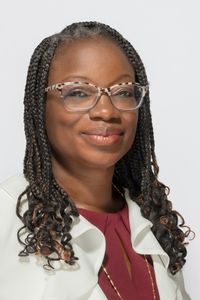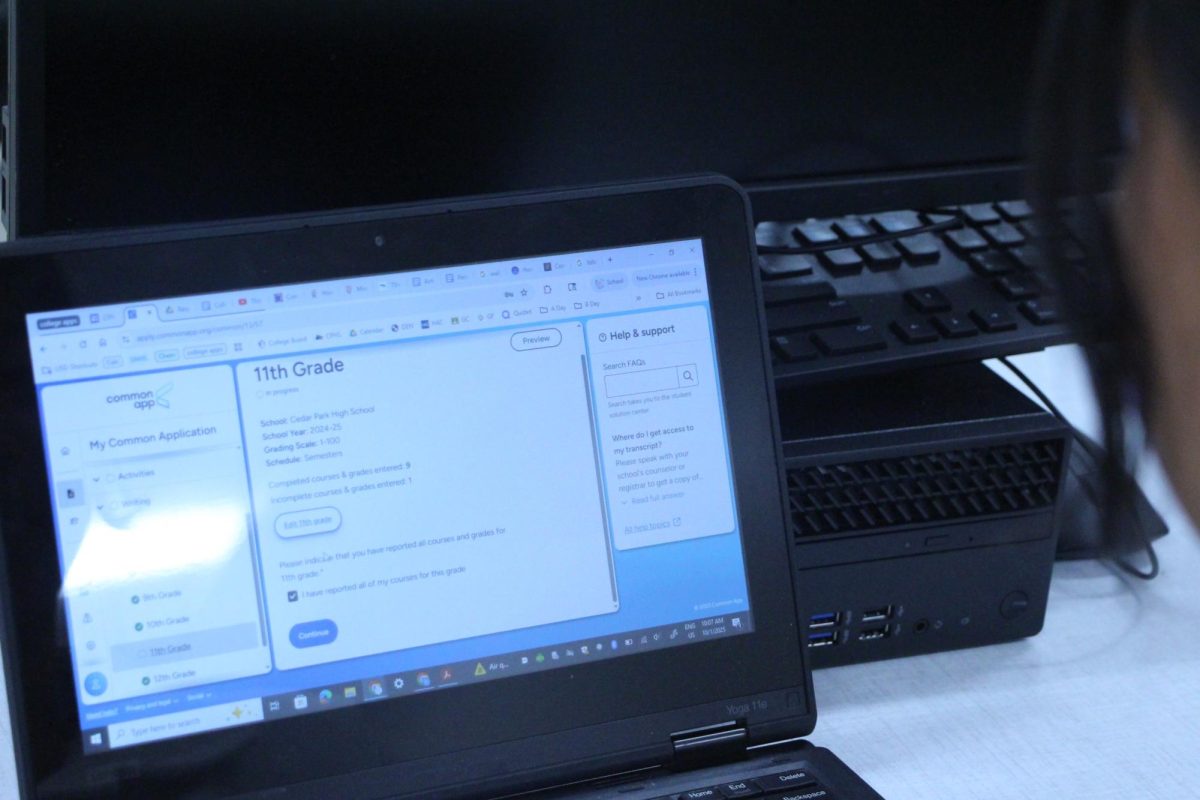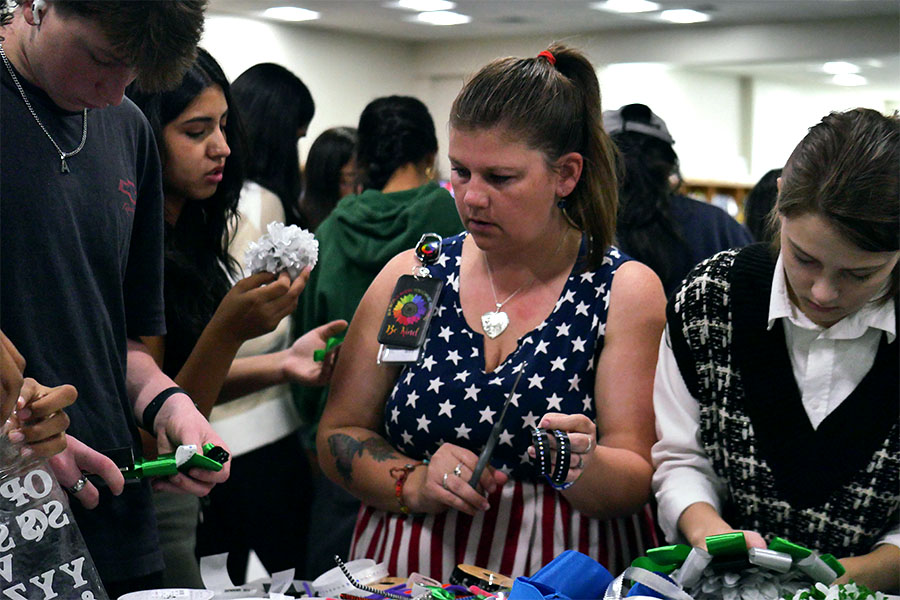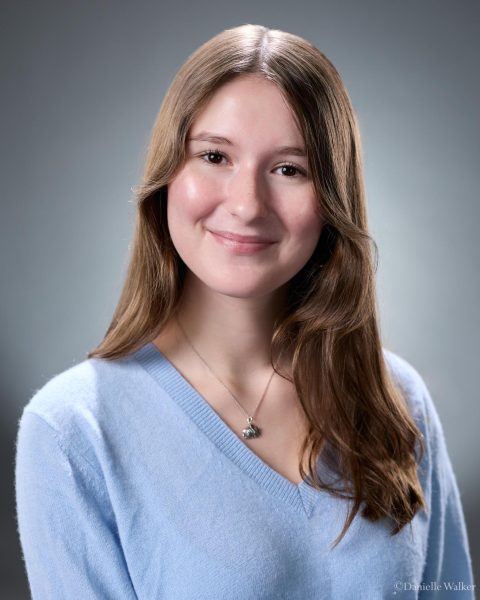
Q: And why are you running for school board again?
A: Well, over the last three years, there have been lots of challenges, but we’ve been making some progress, and I just would like to ask for the opportunity to continue. It’s a very difficult position, and there is quite a bit of ramp up. And so just taking my decade of volunteering in the district and taking all of that experience and my three years of serving on the board and really just moving things forward. And if reelected, I will be the only trustee serving that resides in Cedar Park.
Q: What past experiences make you qualified to be a school board member?
A: So I can start with just talking about who I am and then going into my experiences. So, I am an immigrant from Nigeria, and I moved to the U.S. with a bachelor’s in computer science, and I later got an MBA and JD. So I do have a love for education, and I do have a love and passion for seeing people around me get a good public education, because that is the bulk of our community. I did move to Cedar Park over ten years ago with my family, and I started volunteering in elementary schools, reading with kids and helping with tutoring, with math and mentoring students and just continued to do things to help students and help teachers. I was PTA president and treasurer and served on different committees. And so all of those just help inform me and I also do engage with our community quite a bit, not just people I know, but people that I don’t know. I engage with students, engage with teachers and community members.
Q: Are you satisfied with Dr. Gearing’s job as superintendent?
A: So I do see Dr. Gearing as also, a few things I do like about Dr. Gearing and the work that he’s doing. He does do a pretty good job with hiring and putting the right people in leadership positions and structuring things in a way that will help with our district and helping the students and helping the teachers. The other thing is, under his leadership, we have, he has expanded early childhood education, which is really important for closing the gaps and trying to make sure that people who qualify for early childhood education get a spot and not just sit on the waiting list, because the data clearly shows that if they qualify or not able to get in and stay in, the outcomes are much better than if they qualify or are not able to attend. We’ve also worked with the community to come, teachers, students and community members to come up with the strategic plan. And we’re a couple of years into that. And so just working through all of those, I think that he’s doing the right things to move things forward.
Q: What do you believe is the biggest challenge facing students today?
A: It’s nice to hear from students and I’ve had the opportunity to sit in on a few sessions with students, and I do hear them talk about mental issues being a big challenge for a lot of students these days. Just engagement, student engagement and classroom, staying focused. Those are two big things that I hear from students that are challenges right now.
Q: Do you believe that Leander ISD sufficiently addresses that challenge?
A: It’s still a work in progress. And so, letting people know that the resources that are available and there are lots of there’s a department within the district that helps with that. And also there are community partners that they can put people in touch with. And this is working in conjunction with the students and parents. And I think at different levels of the school, so in elementary school, sometimes those present us could present as behavioral issues, and so they try to identify those early and give them some of the social emotional learning tools that they need. So I think that they have the tools and the resources available and are applying it to the best of their ability.
Q: In your mind, what’s the ideal takeaway you want for a Leander ISD graduate?
A: Ideal take away? Well, there is the graduate profile. And just making sure that students possess critical thinking skills and being able to know how to learn because the jobs that are maybe even in demand now were not and could be in demand in the future, might not be, were not around a few years ago. Looking at someone like me that eventually got a law degree, there was no way in my entire life that I actually foresaw that. But having the ability to just be open to learning and having those critical thinking skills. I think those skills are really, really important because people really should know how to think. And then just exhibiting the other factors, ethical principles and what our graduate profile spells out as well.
Q: And do you have any children enrolled in the district?
A: Yes. So I have two kids that are in the district. They’ve both been in the district since, I would say for the last nine years, since they were old enough to attend Leander ISD school. So they started in elementary school at West Side, and they both went through Cedar Park Middle. So I have an eighth grader now in Cedar Park Middle, and I have a sophomore here at Cedar Park High School.
Q: And what kinds of experiences are they having in the district?
A: I would say that right now they are thriving. They love school. They love their friends. My daughter is crazy about band, and my son’s crazy about football. Their day to day academics, and their friends, they just enjoy those. They tell me that they’d rather pick advanced classes than on level classes, because they tell me that the students in those classes focus differently or what have you, or the challenges are different. And I think that I learn a lot about what happens every day from them. And I think that that disparity between on level and advanced classes should not be there. Kids should be able to take whatever class they want to take, but they’ve been yeah. And my daughter in middle school, she’s had to, gosh, we’ve had to really, well she’s had to really push herself. She’s a really advanced student. And so really finding the opportunities for her to keep thriving as one and she’s found those, some on her own and some with my help.
Q: And how will this impact your time on the board? Or, how does it?
A: So, like I said, I do learn a lot from them. I do learn a lot from their friends. I learn a lot from their parents. And it’s just my initial foray into learning, but then this is just the Cedar Park feeder pattern. So I do have ways to learn from similar things from those in other feeder patterns as well. And just continuing to yeah, sometimes I might be overthinking or thinking about something and or a decision or some of the work that we’re going through, like for example, with I don’t know, I don’t want to give the examples. But anyway, I do hear a lot from them, let me put it that way, and it does help me.
Q: So Leander ISD has a long range planning committee that’s tasked with making recommendations regarding the changing size of the district, facilities and innovation academies. What do you think are the biggest priorities that LISD should be considering in terms of this long range planning?
A: Okay. So this is going to be my, this school year is my first year serving on the long range committee. And in addition to trying to make the best use of our facilities, so that we can, we know exactly where to build schools and when to address growth and what to do with the schools that are shrinking and how to make schools more attractive. So that and being more attractive even helps with the zoning. So people are self zoning out of their schools into other schools and that’s where the innovative academies come in. And there is also the talk about looking into whether we should open the district up, especially certain schools, up to people who are not zoned for the district, so for Leander ISD. So, we do have, Round Rock ISD does that, and it’s just another way to look at making good use of our facilities because attendance does affect our funding and or, yeah, it does affect our funding. And, so I talked about innovative academies, facilities, which I talked about was one other one, open enrollment, opening enrollment to those outside the district. And then just making sure that we communicate with those who would be directly affected and just the district in general, as these thoughts are going or before the final decisions made and as the thoughts are being made.
Q: How do you believe Leander ISD should go about facility optimization regarding schools with lower enrollment?
A: Okay. So I think I touched on that in my last response. And so some of it will have to do with the use of innovative academies. There was a community committee back in 2018-2019 school year that visited some school districts and made recommendations to the district as to what types of innovative academies could be useful. And so, I’ve informed the admin to share that those presentations and discussions at board meetings with the current long range planning committee so that there’s some continuity in the work that others have done, and then they can just build on that, and that will help with working with the community as a whole to determine what the innovative academies would be and where they could be located. So that’s one, innovative academies because that helps fill buildings. It helps others self rezone into those buildings, into those facilities. And then you have just better usage of our facilities. So that’s one we talked about open enrollment. There are some schools that, there’s a talk about where do we put New Hope High School. New Hope High School is basically our first innovative academy in the district and there’s a lot of demand for a new Hope high school but they’re in this tiny building in Leander and there’s just no way for them to grow. They’ve helped a lot of students accelerate and graduate early, and so finding a spot for them is in whether we move LEO with them, without them. There’s just so much discussion on what to do and early childhood, expansion of early childhood, we just can’t find enough space for them too. So those are some of the things that can be done with our existing buildings.
Q: Texas has not increased in Coleman since 2019. Many districts say the state is not fully funding. What is your view and should anything be done to increase public school funding?
A: Okay, so the basic allotment of $6,160 per student, if they attend 100% has not been increased since 2019. At the time the legislature rejected the idea of including an inflationary escalation in that basic allotment, so it hasn’t been adjusted for inflation in five years. And there have been studies that have been done, Raise Your Hand Texas is one of them, and they do show, according to inflation, $6,160 five years ago is $7000 almost $7,500 today. So that’s the gap that we’re having to deal with, about 15%. And not only that, it’s based on attendance. So if you missed two days of school, that’s $25. I’m just, it claws back with every day that you miss. And it’s really about missing the second period. That’s when attendance is taken, and so for funding purposes. But, we build our schools and staff our schools based on the enrolled kids. And so one of the things that we advocate to our legislators is funding based on enrollment, not based on attendance, because if you’re sick and you come back, the teacher still does some work to help you get back on track. So the work is still being done to help you for the days that you were gone and the teachers are still there, for the days that you were gone. So they really need to fund based on enrollment, not attendance. Texas is one of six states left in the country that funds based on attendance and not enrollment. And the state has imposed mandates on the school districts and they don’t fully fund those. For example, full day pre-K is required, but they fund for half day. They require that our elementary teachers take this reading academies and it takes out of their time in the day, but we’re not funded to pay them to do that work, to take that training. They require that we test every student for dyslexia. I mean, these are all great things. It’s just that they don’t fund them. And then they’ve added the security requirement of an armed guard on every campus, and they’re funding practically nothing. They’re providing almost nothing compared to the cost of providing that service, that security service. So it goes on and on and on. And the one mandate that is even, gosh, what turns my stomach is the special ed allotment that hasn’t been increased for over 30 years. And we know that special education needs, it’s not just that it’s increasing, it’s because we’re identifying students more. There is a push to identify them early as much as possible, and then the district just has to pay out of our savings, out of our money to fund providing the necessary services. And it’s just not enough. We definitely need the state to step up and do its own part. So in letting the public be aware of these issues so that they can advocate to the Texas legislators, the senators, the representatives and vote accordingly because public education is always on the ballot, and really work with work in getting people who would push that needle for it, because I just think it’s unacceptable to have these allotments be so stagnant for five years, for 30 plus years. It’s unacceptable.
Q: During the summer, it was announced that we under LISD was facing a roughly $13 million deficit. What do you attribute to that deficit and how do you think it should be addressed?
A: All right, so I just told you how the district has spent out of its pocket to fund special education and that amount is over $30 million. So if the district didn’t have to pay that, guess what? We’ll be in a surplus. So even just that by itself is enough. There has been, gosh, there’ve been so many reviews of the budget, line item by line item, working with campuses. Unfortunately, the growth that is necessary, there’s been some growth because I did look at the numbers. We’ve grown our number of teachers and that helps reduce class sizes to some extent. I know the class sizes still look large in some areas, especially secondary, but I do see that there’s been quite a bit done when it comes to elementary levels. And so, even though we’ve grown in terms of teachers, but it has to do with also the growth in enrollment and just really trying to find, continue to find opportunities for savings and there’s only so much that you can cut. You really still have to grow the revenue. Letting people know, letting everybody know that you show up at second period in order to get your attendance done and find out what second period is in your school. And that way, the school can get, the district can get the funding, because if your kid comes for third period to the end of the day, no funding, even though they’re there.
Q: There has been growing polarization and tension among school boards across the country, and we’ve seen some of that tension in our own board. How do you see yourself working with board members you may disagree with?
A: So, one of the things is that some people might think that all of us or most of us maybe think the same way, but we don’t. We all think differently. We might arrive at similar conclusions, but we get there in different ways, and it’s just about being respectful, listening to others first and really listening and before you and it’s listening not to respond, but listening to actually hear what they have to say and absorb that, give them the benefit of a doubt that they’re they’re also there for the best of the students. And sometimes it’s because it could be because of a lack of understanding of what the other person has to say, so that’s, or lack of information. And so that’s where listening comes in. You might even have experts. For example, school finance is a very hard, the way Texas school finance works is a very complicated and sometimes difficult thing to understand. So it helps with bringing in experts to explain and to teach on what some of these mean. But I think it’s really just about taking a position of being very respectful and wanting to listen to other people.
Q: In the last two years, election integrity has become a hot topic in politics. Do you believe there are problems with our election system locally or nationally?
A: No, I don’t think there’s any problem. I haven’t seen any evidence of that. And so I don’t know why people would say that, but I don’t see any evidence of that.
Q: Would you accept the outcome of the election if you lose?
A: Oh, yeah.
Q: And since you are an incumbent, what’s been your biggest accomplishment as a school board member?
A: So I would say, gosh, which one would I pick now? That’s a hard one. I can talk about a few things and I can end up picking one. So I would say being able to communicate with everybody. This is a nonpartisan position. This is about the students. It’s about the teachers. It’s about building our community and keeping that focus. And just working with everybody has been something that I’m known for. And just keeping admin focused on finding the funds to help our teachers. Finding, focusing on our strategic plan, which says you need to listen to our teachers, you need to listen to our students, we need to listen to our community. So it’s really working on all of those and then working with the data to make sure that every child is getting an opportunity. So just doing, it’s a really hard job and it’s very time consuming and putting in all of those hours to get all of that done for increasing our student outcomes.
Q: What are you hoping to accomplish if you get reelected?
A: So it’s really continuing on that path. And, let’s see. So like I said, this is my first year going to be on the long range planning committee as a board member. And so at the end of the day, the board does approve, I guess, whatever recommendations approve or not, recommendations come out of the long range planning committee. So I want to make sure that we do have a pulse on what the community is discussing and what kind of information the board needs in order to make a decision. So that way, the entire board of seven can make the best decision with the best and, with the long range committee also making that, using the right data to make the best decision. Just seeing increase in communication between our, between the school, the district and between the district, the schools and the community. Just work better, have increased student engagement, find ways to increase student engagement so that they really not just want to come to school, but want to learn and thrive. And looking at the different groups of students and making sure that every single one of them is progressing in the right direction. And yeah, just just continue to look for progress with our student outcomes.
Q: The district rezoning caused a lot of local controversy. Do you stand by the decisions made? What have you learned from that experience?
A: So rezoning is always very difficult, very, very difficult. And I think of myself when I, way before I joined the board, living in Cedar Park, where I live. Yeah, we’ve had a lot of angst and anger too at past rezoning exercises. So I think it’s really hard, regardless of which decision, which way your decision goes, I think it’s really hard for most people to be satisfied because what happens is, people fall in love with their local schools. And so when you’re rezoned, they can’t imagine having to start that all over again somewhere. They just love their schools and they don’t want to be taken away from the schools. The last exercise did have issues. It was not without issues at all, just like past ones. The secondary rezoning had issues. The elementary rezoning had issues. What I learned from them is with the secondary rezoning, I would say that the data that we based the decision on turned out to be not as aggressive as we expected it to be. About a year later or some months later, and so, finding something to do with that balance of rezoning early so that people can start to make plans versus the thought that the data could be stale. So I’m thinking maybe to make sure that the rezoning maybe might be in two steps. So it could be the first year, this is what it would look like for these neighborhoods. And then if the data turns out to be as aggressive, then we’ll do this. If not, then we’ll just keep it where it is here. And for the ones, for the initial ones, it could be maybe people who live within two miles and don’t have a hazardous route, but somehow got zoned further away. If they get pulled back in, then it becomes a neighborhood school all over again. So we did have some of those in the Cedar Park area where bringing them in was basically bringing them within two miles of the school. So those are just some examples, but of course, there’s just continued community conversation on this. So those are some of the things that I can think of that the facility usage information was not made available when we wanted it. So that’s another thing, but that has been resolved. And going forward, I believe it will continue to be resolved. And yeah, so there are things that we learned and the things that we’re working on to fix it, but I’m still keeping my eye on the enrollment information. And we do have some, I do keep in touch with our community members that provide input so that we can work with the admin if things start to head south in certain schools.
Q: What’s your favorite high school memory?
A: Oh boy. So, man, that’s a long time ago. That was in the 80s. Man, I have to go way back. I just love school in general. What did I like about high school? I mean, I still have a lot of those friends still today, thanks to Facebook. I can’t, I can’t remember. School was just fun. I just liked it.
Q: Okay well, thank you so much, those are all of our questions. Is there anything else that you’d like to add?
A: Let’s see. No, I can’t think of anything else, but, I just would like the opportunity. I’m grateful for the opportunity to have served as a trustee for the last three years. And I really would like the opportunity to continue because it’s just what I love doing. I’ve gathered a lot of information and made a lot of connections in the communities all over, from the South all the way up to the North and in the Central too. And I think that all of those things matter, that the continuity is really helpful.






![As her hair blows in the wind, senior Brianna Grandow runs the varsity girls 5K at the cross country district meet last Thursday. Grandow finished fourth in the event and led the varsity girls to regionals with a third place placement as a team. “I’m very excited [to go to regionals],” Grandow said. “I’m excited to race in Corpus Christi, and we get to go to the beach, so that’s really awesome.” Photo by Addison Bruce](https://cphswolfpack.com/wp-content/uploads/2025/10/brianna.jpg)


![Broadcast, yearbook and newspaper combined for 66 Interscholastic League Press Conference awards this year. Yearbook won 43, newspaper won 14 and broadcast took home nine. “I think [the ILPC awards] are a great way to give the kids some acknowledgement for all of their hard work,” newspaper and yearbook adviser Paige Hert said. “They typically spend the year covering everyone else’s big moments, so it’s really cool for them to be celebrated so many times and in so many different ways.”](https://cphswolfpack.com/wp-content/uploads/2025/05/edited-ILPC.jpg)





![Sitting with her friend senior Sohpia Struve at last year’s Austin City Limits Festival, senior Ava Zuniga poses for a picture under a pavilion. They are frequent attendees at ACL, an annual music festival at Zilker Park. “I would recommend seeing a bunch of people,” Zuniga said. “This past year, we camped out for Chappell [Roan] for a really long time. I think the whole point of ACL, [which] is a lot of fun, is that you can go see so many different people, even if you don’t know them. So by camping by one person, it really limits yourself from being able to go see a bunch of people.” Photo courtesy of Ava Zuniga](https://cphswolfpack.com/wp-content/uploads/2025/10/EE9E9484-FE6F-4AA0-B5F5-0C177AB32841-1200x857.jpeg)
![Looking down at his racket, junior Hasun Nguyen hits the green tennis ball. Hasun has played tennis since he was 9 years old, and he is on the varsity team. "I feel like it’s not really appreciated in America as much, but [tennis] is a really competitive and mentally challenging sport,” Nguyen said. “I’m really level-headed and can keep my cool during a match, and that helps me play a bit better under pressure.” Photo by Kyra Cox](https://cphswolfpack.com/wp-content/uploads/2025/09/hasun.jpg)

![Bringing her arm over her head and taking a quick breath, junior Lauren Lucas swims the final laps of the 500 freestyle at the regionals swimming competition on date. Lucas broke the school’s 18-year-old record for the 500 freestyle at regionals and again at state with a time of 4:58.63. “I’d had my eye on that 500 record since my freshman year, so I was really excited to see if I could get it at regionals or districts,” Lucas said. “ State is always a really fun experience and medaling for the first time was really great. It was a very very tight race, [so] I was a bit surprised [that I medaled]. [There were] a lot of fast girls at the meet in general, [and] it was like a dogfight back and forth, back and forth.” Photo by Kaydence Wilkinson](https://cphswolfpack.com/wp-content/uploads/2025/03/Kaydence-2.7-23-edit-2.jpg)
![As the support team sits and poses for a photo in the cafeteria with the counseling team they eagerly wait to start their day. "We [all] seem to be a team, I get up every day and there's days where I don't want to go to work today, but I'm thankful that I have a job and I'm blessed to have what I have," Christopherson said. Photo Courtesy of Julie Weltens.](https://cphswolfpack.com/wp-content/uploads/2025/01/AF9E8470-10D7-4C91-BF28-EC8F86BAB66C-1200x852.jpeg)
![Jumping off the ground, senior linebacker Bennett Patton snatches the ball out of the air for an interception at Thursday’s game against Chaparral. Patton had two interceptions in the 56-14 victory, tying the school record for interceptions in a game. “I was just playing the game,” Patton said. “[I’m] going to go into next week, forget about it and stay humble.” Photo by Harper Chapman](https://cphswolfpack.com/wp-content/uploads/2025/09/bennett-interception.jpg)














